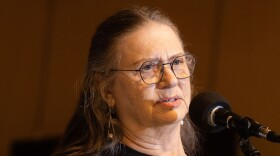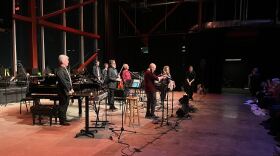Towering over the Ozark Mountains in Arkansas is a giant statue of Jesus known as Christ of the Ozarks. This seven-story-tall white statue peers over the residents of Eureka Springs and one of its main attractions: the Great Passion Play. It's a fully-produced reenactment of the life and crucifixion of Jesus Christ in an amphitheater that seats thousands.
What you wouldn’t typically associate with this small, southern Christian town is its LGBTQ+ population, their political activism, and their embrace of their faith. But that’s the story that filmmakers Michael Palmieri and Donal Mosher found when they arrived.
Palmieri and Mosher were originally sent to Arkansas to cover the passage of the citizen-wide Non-
"We went down there and covered the fight over [the ordinance] and the vote, but once we got down there we realized there was a much more interesting story there so we ended up staying down there for about three more years," says Palmieri.
Their resulting documentary, The Gospel of Eureka, examines the worlds of the Passion Play and the LGBTQ+ performers and patrons at a gospel drag show in a popular gay bar. Everyone is looking for faith, love and civil rights in their own practices. The documentary, narrated by Mx Justin Vivian Bond, was the official selection of the 2018 SXSW Film Festival and premiered on PBS’ series POV in July.
Editor’s note: This video contains language that may be offensive.
https://www.youtube.com/watch?v=A3bMqOo0owc
"To find a place like Eureka where people feel free to leave their faith, keep their faith, redefine their faith, whatever their political position is, was kind of a miracle to me." - Donal Mosher
Mosher fled North Carolina as a teenager after he was physically attacked for being gay. So for him, seeing southern gay, lesbian, and queer Christians actively reshaping and expressing their faith was a teaching moment.
"To find a place like Eureka where people feel free to leave their faith, keep their faith, redefine their faith, whatever their political position is, was kind of a miracle to me ... It taught me how much things have progressed," he says.
Palmieri says although he does not identify with Christianity as a gay man, the dialogue between conservative Evangelical Christians and liberal populations of faith is constantly ongoing. "But I don't think many people have examined it that way," he notes. "It's always pitched as a battle. It's a little more complicated than that."
Palmieri and Mosher say that they were very conscious to not make fun of their subjects as other films or television spots may have done. Filming around the Passion Play helped them to discover a "campy magic" that was happening with the people involved, according to Mosher.
"The LGBT Christians in the town, they didn't seem to have an issue with [the Passion Play] and in fact are participating in it," Palmieri adds. "So, that opened my eyes towards what is acceptable in this community, what am I not seeing?"

Ultimately, both the gospel drag shows and the Passion Play are about communities expressing themselves theatrically for each other, says Palmieri. "Really, they're both drag shows," he notes. "So, in some ways we're sort of leveling the playing field that way by showing how similar the performances are."
The directors hope that audiences will feel a sense of hope and see that there are more similarities than differences at the core of what people are believing in.
"We're not going to erase Christianity from the fabric of American life," notes Mosher, "so we should see the breadth of it as much as we can and find what strengths it can give to making progressive choices."






